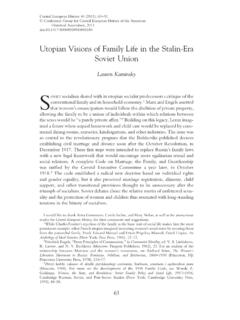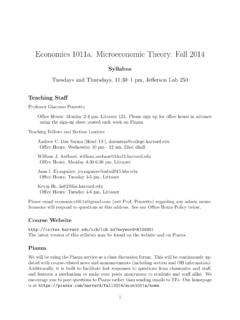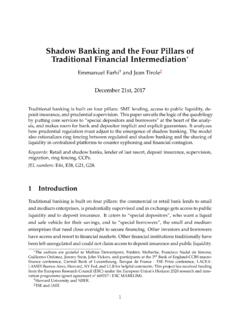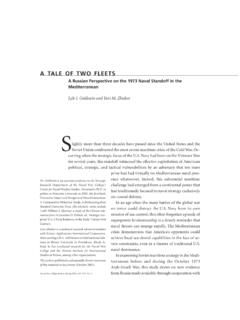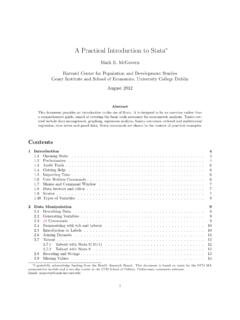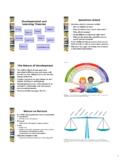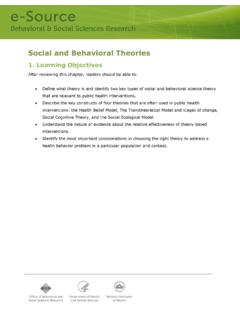Transcription of Race, Racism, and Discrimination: Bridging …
1 Race, racism , and discrimination : Bridging Problems, Methods, and theory in SocialPsychological ResearchAuthor(s): Lawrence D. Bobo and Cybelle FoxReviewed work(s):Source: social Psychology Quarterly, Vol. 66, No. 4, Special Issue: Race, racism , andDiscrimination (Dec., 2003), pp. 319-332 Published by: American Sociological AssociationStable URL: .Accessed: 25/02/2013 14:52 Your use of the JSTOR archive indicates your acceptance of the Terms & Conditions of Use, available at ..JSTOR is a not-for-profit service that helps scholars, researchers, and students discover, use, and build upon a wide range ofcontent in a trusted digital archive. We use information technology and tools to increase productivity and facilitate new formsof scholarship. For more information about JSTOR, please contact .American Sociological Association is collaborating with JSTOR to digitize, preserve and extend access toSocial Psychology This content downloaded on Mon, 25 Feb 2013 14:52:03 PMAll use subject to JSTOR Terms and ConditionsSocial Psychology Quarterly 2003, Vol.
2 66, No. 4,319-332 Race, racism , and discrimination : Bridging Problems, Methods, and theory in social Psychological Research* LAWRENCE D. BOBO CYBELLE FOX Harvard University Scholars spanning the social sciences and humanities wrestle with the complex and often contested meanings of race, racism , and discrimination . In all of this enterprise, soci- ologists rightly retain a special claim to illu- minating processes of group boundary maintenance, systems of racial inequality and supporting ideologies, and attendant patterns of intergroup behavior (Jackman 1994; Lamont 2000). Mainstream sociological research, however, has focused principally on the structural manifestations of race, racism , and discrimination , particularly as they char- acterize black-white relations (Wilson 1978). Sociologists have made signal contributions to the understanding of modern ghetto job- lessness and poverty (Wilson 1996), of racial residential segregation (Massey and Denton 1993), and of fundamental disparities in accu- mulated wealth (Oliver and Shapiro 1995).
3 In some critical respects this work has expanded to include multiracial and multiethnic com- parisons with respect to both key economic (Lichter and Oliver 2000; Smith 2001; Waldinger 1996) and residential outcomes (Charles 2001; Emerson, Yancey, and Chai 2001). To a surprising degree, however, the micro social processes necessarily embedded in these structural analyses are still largely unaddressed. Yet the basic social processes invoked by the terms race, racism , and discrimination are quintessentially social psychological phe- nomena; sociologists ignore or downplay this basic insight at the discipline's peril. These concepts concern the meanings of social groupings and how those meanings come to guide patterns of relations among individuals recognized as members of particular groups. They immediately entail the labeling and social learning of group categories, identity, feelings, beliefs, and related cognitive struc- tures.
4 These factors, in turn, are expressed in lines of interaction and behavior that flow from, reinforce and reconstitute, or come to transform those social categorizations. In addition, such categorizations have direct implications for the structure and basic con- ditions of social organization. That is, Race, 1 Racism, 2 and discrimination3 are also, and perhaps most fundamentally, bases and mechanisms of hierarchical differentiation that shape the ordering of social relations as well as the allocation of life experiences and life chances (Zuberi 2001a). * Direct correspondence to Lawrence D. Bobo, Department of Sociology, Harvard University, Cambridge, MA 02138; 1 We conceive of race, or more broadly ethnoracial distinctions, as historically contingent social construc- tions. These distinctions or categorizations will vary in configuration and salience over time (Collins 2001; Omi 2001) as well as by important intersections with age, class, gender, and sexuality (Cohen 1999).
5 Similarly, the practices and policies of government play a major role in the understanding and social effects of these categories (Nobles 2000). Although such categorization may invoke consideration of physical and biological markers such as hair texture, skin tone and color, and other observable markers, neither these indicia nor deep primordial imperatives give ethnoracial categories their social significance. 2 We conceive of racism as a set of institutional con- ditions of group inequality and an ideology of racial domination, in which the latter is characterized by a set of beliefs holding that the subordinate racial group is biologically or culturally inferior to the dominant racial group. These beliefs, in turn, are deployed to prescribe and legitimize society's discriminatory treatment of the subordinate group and to justify their lower status (See and Wilson 1989; Wilson 1973).
6 3We think of discrimination as a "complex system of social relations" (Pettigrew and Taylor 1990:688) involving actions, subtle or overt, "that serve to limit the social , political, or economic opportunities of par- ticular groups" (Fredrickson and Knobel 1982:31). discrimination may be either direct or indirect, and may have both short- and long-term consequences (Pettigrew and Taylor 1990). 319 This content downloaded on Mon, 25 Feb 2013 14:52:03 PMAll use subject to JSTOR Terms and Conditions320 social PSYCHOLOGY QUARTERLY For these reasons, sociologists and social psychologists of several stripes have devoted great energy to unraveling "the problem of race."4 Yet broad and powerful general theo- ries of race, racism , and discrimination still elude us (See and Wilson 1989; Winant 2000). social psychologists, some argue, have been slow to examine how ethnoracial distinctions may influence what have been regarded as otherwise general social psychological processes (Hunt et al.)
7 2000). Certainly the lit- erature contains a number of distinct and vital clusters of intellectual activity: some focus on problems ( , minority status and performance in school), some on method ( , surveys of racial attitudes), and others on theory ( , status expectation states the- ory). One consequence is that the field is not so much balkanized as composed of several disparate, mutually insular intellectual com- munities. As a result, a key challenge for scholar- ship in this area is to reach beyond the boundaries of customary and specific research problems, methodologies, and theo- ries. Theoretical advances often emerge from methodological innovations, especially those which bridge different methods of investiga- tion. The domain of race, racism , and discrim- ination, for example, has taken important steps to address the influence of contextual variables such as group size and degree of economic inequality (Kinder and Mendelberg 1995; Quillian 1995) and to make use of hierarchical modeling (Quillian 1996; Taylor 1998), and of survey-based experiments (Bobo and Kluegel 1993; Kinder and Sanders 1990; Schuman and Bobo 1988; Sniderman and Carmines 1977), as well as linking in-depth interviews with surveys (Krysan 1999).
8 Each of these steps has deep- ened our knowledge significantly. To further advance the impetus toward " Bridging ," this special issue now unites three goals in seeking to increase social psycholo- gy's understanding of processes of race, racism , and discrimination . One key goal of this volume has been to encourage bridges across major subareas, methods, and theories. The challenge of building more general theo- ry will be met only insofar as studies across an array of "middle range" theories are brought into direct dialogue on the various problems, questions, and methods of analysis that typically distinguish and organize domains of social research. A second goal has been to encourage work of multiethnic scope. More and more research is not only reaching beyond the black-white divide but also adopting a strate- gy of simultaneous and rich multigroup com- parisons.
9 Our third goal is to highlight work that adopts a target-group or minority-group frame of reference. For too long, social psy- chological research has tended to assume that the views of those in minority or disad- vantaged positions were derived entirely from, or simply a maladaptive response to, perspectives and impositions on the part of the dominant group. social PSYCHOLOGICAL PROCESSES OF RACE IN MAJOR LIFE DOMAINS Even though we lack broad, general the- ories specifying how race, racism , and dis- crimination operate, at least, fortunately, we possess major theoretical approaches in vari- ous domains of social life. Strong research lit- eratures exist in these domains. The contributions to this special issue offer criti- cal extensions of ideas on identity, schooling, and achievement processes; organizations, labor markets, and workplaces; interpersonal interaction across the color line; social struc- tural and psychological theories of prejudice; and the social and political effects of the new immigration.
10 We examine briefly each of these domains and discuss how the new research reported here helps to advance our knowledge. 4 A number of recent reviews from distinct tradi- tions, covering far greater terrain than we may hope to address here, deserve note. Critical assessments of the survey-based literature can be found in Sears, Hetts et al. (2000), Bobo (2001), and Krysan (2000). Assessments of important strands in the experimental literature can be found in Banaji and Hardin (1996), Blair and Banaji (1996), Dovidio (2001), and Fazio and Olson (2003). Relevant qualitative studies are reviewed by Bonilla-Silva (2001), while Dawson and Cohen (2002) provide a cogent assessment of research on race in political science. This content downloaded on Mon, 25 Feb 2013 14:52:03 PMAll use subject to JSTOR Terms and ConditionsRACE, racism , and discrimination 321 Identity, Schooling, and Achievement Processes Extensive research on schooling, perfor- mance, and achievement has shown that neg- ative cultural stereotypes about racial and ethnic minorities can exert debilitating effects on minority youths' academic achievement.
